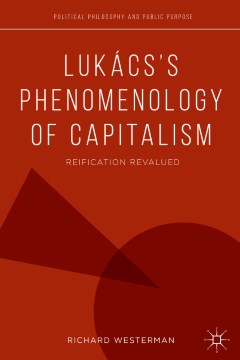Book | Chapter
The interpellation of the subject
pp. 153-199
Abstract
Challenging the claim the Lukács depends on a Fichtean expressive-creative subject in order to overcome reification, Westerman argues that Lukács's subject is defined within the meaning-structures of consciousness. It is the subject-pole of social practice, interpellated as acting in certain ways by the objectively determined meaning of the commodity. Westerman offers a highly original reading of Lukács's account of subjectivity by relating his account to Alois Riegl's account of the subject-position revealed by formal analysis of works of art. Drawing on Riegl's distinction between internal and external coherence, he distinguishes between social forms that exclude or incorporate spontaneous subjectivity within collective practices: reification is the result of the commodity form defining objects purely in relation to other objects, and excluding any subjective input whatsoever. In contrast, Lukács argues that a revolutionary Party must be formed on the basis of free participation by all its members—not led from above by an all-knowing leader. Westerman concludes by identifying Lukács's Kierkegaardian argument that the structures of history can generate a moral imperative for revolution.
Publication details
Published in:
Westerman Richard (2019) Lukács's phenomenology of capitalism: reification revalued. New York, Palgrave Macmillan.
Pages: 153-199
DOI: 10.1007/978-3-319-93287-3_5
Full citation:
Westerman Richard (2019) The interpellation of the subject, In: Lukács's phenomenology of capitalism, New York, Palgrave Macmillan, 153–199.



